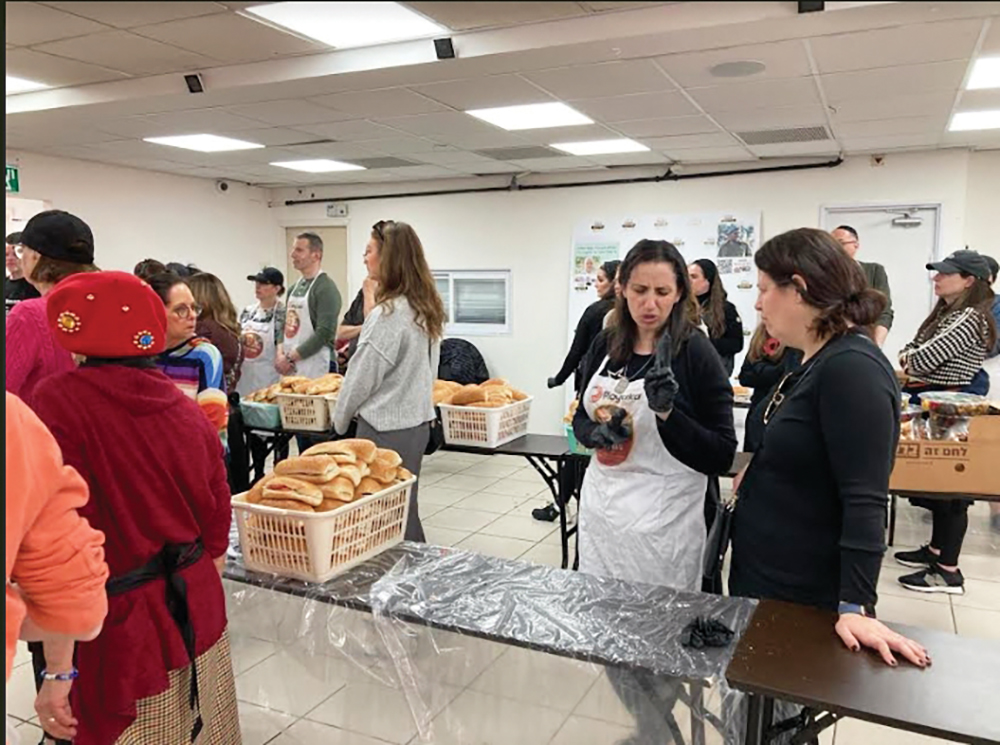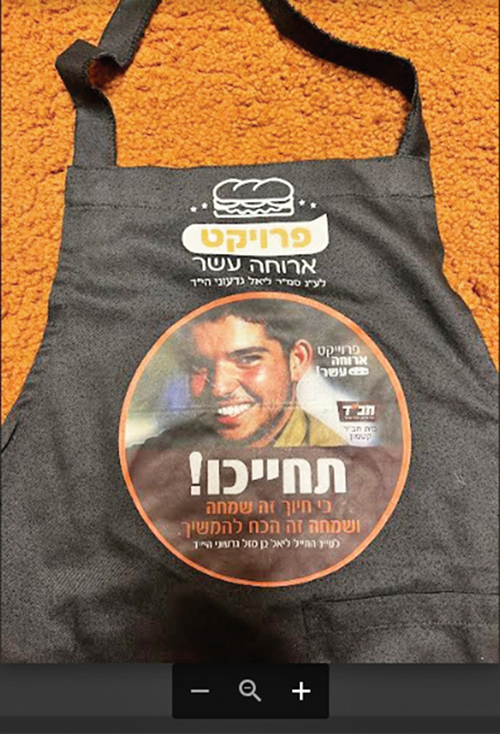
A common meeting place for many, the Chabad Center in Katamon, Yerushalayim, is bustling with busy people doing ordinary and extraordinary work. In these times of war, this rather large meeting room had been turned into a beehive for regular volunteers and strangers to unite for a common cause: making sandwiches. For whom, what, when, where, how?
As a female stranger hesitantly entered the area that held six long tables covered with tablecloths and people standing around the tables, she heard loud Hebrew music blaring as more people streamed into what looked like an impromptu set of activities. However, this was not what it appeared to be at first. Instead, it was a well-oiled beehive of strangers working together for a common cause: feeding people.
The stranger was looking desperately for a familiar face when she finally noticed her female friend waving her hand from inside the busy room. She eagerly joined her longtime acquaintance, who instructed her to don an apron and disposable gloves as the friend continued cutting hot dog rolls. She joined her companion as she heard other women standing close by at the same table saying they were waiting for instructions on how to properly construct the tuna and pickle sandwiches. As someone in charge of the operation came to the table, her words were repeated to the eight people grouped together.

“Not too much tuna and only four pickle slices. Any other formula makes the sandwiches too mushy and then they are not eaten. Incidentally, the reason you’re wearing gloves is so that you can scoop out the tuna and pickles from their vats with your gloved hands; it’s the quickest way to complete the job!”
“Hmmph!” the foreigners grunted as they looked at each other and grinned widely.
After the formula was enacted as directed, the finished products were deposited into a large box at the end of the table. The box was transported to wrapping stations where other volunteers completed that activity with the help of an automatic plastic-wrap apparatus. Sometime in the middle of the sandwich-making activity a loud voice from the front of the room began speaking. A Chabad rabbi introduced another gentleman who began speaking in English; the rebbe translated his words into Hebrew.
Complimenting the workers for contributing their precious time and energy as they demonstrated their unwavering concern for the country, the speaker then began explaining how the sandwich-making project originated at the Chabad Center eight years ago. That was when a soldier named Lior Gidoni fell in battle in a military operation against Hamas. He was in his early 20s. His devastated family tried to piece together some way to memorialize their thoughtful, kind and exceptionally compassionate son. Rather than donating funds to a static one-time event or memorial, his mother wanted to encapsulate the virtues that defined her son in an ongoing chesed. She thought about various activities her son engaged in as he was growing up. The activity that she thought defined him best occurred when he was 7 years old.
Every day, she made Lior a sandwich for lunch. One day, however, the 7-year old asked his mom for six sandwiches. She complied with his request but the next day when he asked for the same six sandwiches, she asked her son why such a young boy needed so many sandwiches.
“Is it possible that you are eating all six of the sandwiches?”

“Ema, they are not all for me. They are for my classmates who have ‘forgotten’ their lunches. How can I sit and eat and watch them looking sadly at all of us who are eating our scrumptious sandwiches, and not have anything to give them?”
Recalling that unique quality of her empathetic son gave birth to the idea of sharing lunches with students who sat in classrooms hungrily eyeing their more fortunate classmates. When this idea was broached to Chabad they enthusiastically embraced the opportunity to enrich young students’ lives with physical sustenance. As the war began on October 7, 2023, however this operation needed to expand in scale. More volunteers were needed daily to also provide sandwiches for the chayalim (soldiers). Hence an open invitation to join the in-house crew of volunteers was sent out whereby not even a prior registration to volunteer was required: Come to this address any day from 10 a.m. to noon (except Shabbat) and contribute to this most satisfying cause. The outpouring of both monetary and people support has been incredibly successful.
Anita Kolat, of Elizabeth, recently returned from a 10-day trip to Israel to do volunteer work. Making sandwiches in Katamon, Yerushalayim, was one of several volunteering projects in which she participated.







